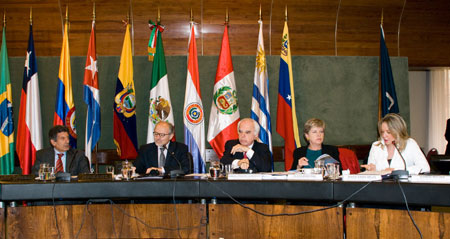ECLAC Advises Greater Latin American Participation in the International Monetary System
Work area(s)
Alicia Bárcena participated in debate to promote a common regional position at the next G20 Summit.

(19 October 2011) The Executive Secretary of the Economic Commission for Latin America and the Caribbean (ECLAC), Alicia Bárcena, called for the region to participate more in the debate on the international monetary system during a meeting in Montevideo, Uruguay.
"Latin America deserves a place at the table to discuss the international monetary system, given that it is a region which has strengthened its monetary reserves over the past years," she stated in the meeting Latin America and the G20 group: creating a space for regional dialogue, organized by the Latin American Integration Association (ALADI).
Participants at the meeting held on 18 October included the Acting President of Uruguay, Danilo Astori; the Secretary-General of ALADI, Carlos Álvarez; the Secretary-General of the Union of South American Nations (UNASUR), María Emma Mejía; the High Representative for Mercosur, Samuel Pinheiro Guimarães; the Secretary-General of the Andean Community (CAN), Adalid Contreras; the Minister for Foreign Affairs of Argentina, Héctor Timerman; the Minister of Finance of Paraguay, Dionisio Borda, and representatives from the 12 countries which make up ALADI.
The objective of the meeting was to reach a common regional position for the next G20 Summit on 3 and 4 November in Cannes, France. Argentina, Brazil and Mexico are the only Latin American countries which are part of this multilateral forum, which on this occasion will discuss the European financial crisis and how to achieve a more inclusive financial system.
Alicia Bárcena stated that a new global governance structure is needed, which aims towards real multilateralism and reflects the interests and needs of all of the States, including above all developing countries.
"We must form new visions of a global, and in particular, regional financial structure to deal with international crises more effectively," she said. This could be carried out by strengthening the Latin American Reserve Fund of the Andean Development Corporation (CAF)-Development Bank of Latin America or the creation of a new regional fund, she informed.
"It would be a reserve fund which would remain tied to the dollar, but it would protect and lower the costs of transactions, for example, commercial exchanges," she explained.
As for the G20, the Executive Secretary of ECLAC stated that a balance between the capacity, efficiency and legitimacy in the design of global governance institution frameworks must be found.
"A basic question is if the G20 is capable of dealing with structural problems and the root causes of economic and financial crises. Likewise, how can multilateral organizations take on the functions that were covered by this group today," she stated.
She explained that one solution is to institutionalize the G20, incorporating it into a wider system, perhaps transforming it into a possible Economic Security Council, a type of Economic Committee within the United Nations, as suggested by the Stiglitz Commission, established by the President of the 63rd Session of the United Nations General Assembly.
Any queries should be addressed to the ECLAC Public Information and Web Services Section. E-mail: dpisantiago@cepal.org; Telephone: (56 2) 210 2040.
Follow us on: Twitter, Facebook, Flickr and YouTube.
Contact
Public Information Unit
- prensa@cepal.org
- (56 2) 2210 2040